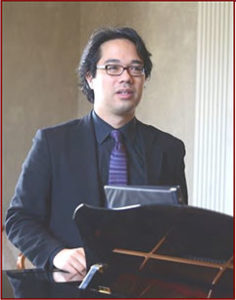Newsletters – Dec 2016
Two Carnegie Hall Performances
Suliman Tekalli made his Carnegie Hall debut in April with harpist June Han, a faculty member at the Yale School of Music and the Juilliard pre-college division, as well as cellist James Jeonghwan Kim.
Rixiang Huang performed a solo recital in October at Carnegie Hall as a result of winning first prize at the New York International Artists Competition in May.
Trio Céleste is on the Grammy Ballot
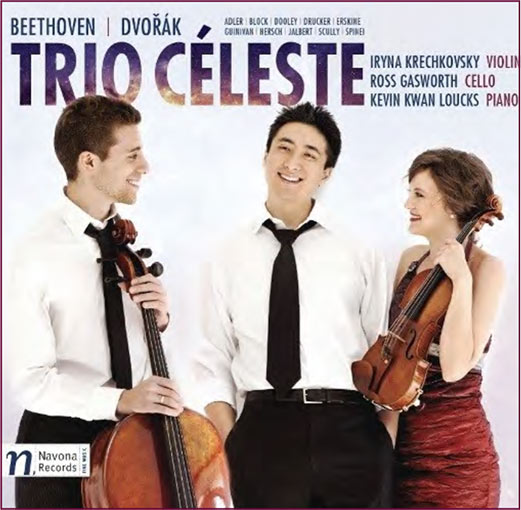
Trio Céleste, with musicians Kevin Kwan Loucks and Iryna Krechkovsky, has released a debut CD that has been placed on the ballot for the 2017 Grammy Award nominations. Kevin and Iryna have been heard performing for M.U.S.i.C. in several programs. We look forward engaging them on our series again.
M.U.S.i.C. on the Radio
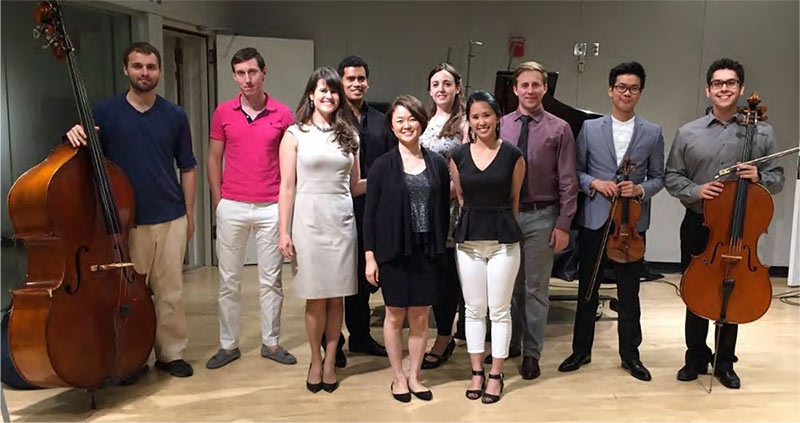
M.U.S.i.C. was invited to perform on the WCLV radio program “First Fridays” with Angela Mitchell (host) on September 2nd.
The musicians were interviewed and Jodi Kanter, artistic director, spoke about our organization. The program featured works they had previously performed for our programs.
Henry Samuels, Alex Kostritsa, Angela Mitchell (host), Megan-Geoffrey Prins, Koko Watanabe, Elizabeth Frey, Amy Tan, Brian Skoog, Solomon Liang, Chauncey Aceret
M.U.S.i.C. performers’ careers are launched!
Opera News
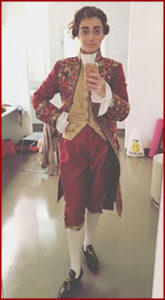
Samantha Gossard sang the role of Cherubino in the Lyric Opera of Kansas City’s fall production of The Marriage of Figaro. She was also chosen as a national semi-finalist in the Metropolitan Opera National Council Auditions.
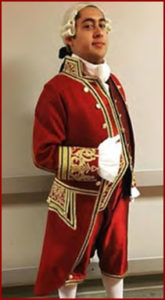
Armando Contreras was heard singing in the chorus. He was also heard singing in our September benefit program.
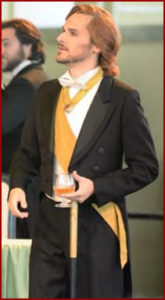
Brian James Myer, Opera San José’s newest baritone and member of the resident company, sang the role of Figaro in its fall production of The Marriage of Figaro.
Quotes about his performance from the media
“Brian James Myer is a ridiculously talented Figaro, exhibiting notes both
falsetto and basso profundo in his deft attack on the role.”
“Myer’s unwavering charm and energy stole nearly every scene he was in.”
Orchestra Appointments
Get to Know More About the Musicians Performing in our Upcoming Concerts
JUNG EUN OH, SOPRANO
When did you fall in love with your instrument?
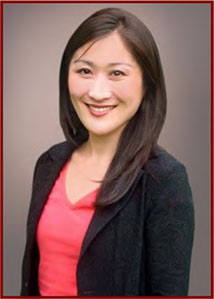 I actually played the piano for a very long time before I began to sing. In fact, I did not have a nice voice growing up – I was once singing in this church group as a teenager, and the sound guy turned my microphone off because I didn’t sound good. So I remained a pianist until I got to college. At Harvard, I found a group of amazing friends and directors who loved singing, and I think I learned to love the voice through them. There is something about the human voice that is so profound… I think it is the most relatable instrument, at the most basic, instinctive level.
I actually played the piano for a very long time before I began to sing. In fact, I did not have a nice voice growing up – I was once singing in this church group as a teenager, and the sound guy turned my microphone off because I didn’t sound good. So I remained a pianist until I got to college. At Harvard, I found a group of amazing friends and directors who loved singing, and I think I learned to love the voice through them. There is something about the human voice that is so profound… I think it is the most relatable instrument, at the most basic, instinctive level.
What are some of the challenges in performing vocal repertoire?
I think the greatest challenge for any musician is to make their pieces sound effortless. It requires immense amount of technical excellence and concentration to play any piece well, but it has to sound like art, not a robot. The French pieces I am singing are fun, some of them sound “easy,” but they require just as much technique and vocal expertise as a piece by Stravinsky or Mozart.
What do you look forward to when you play for M.U.S.I.C.?
I look forward to meeting new musicians, working again with old friends, and making great music in an intimate setting for an enthusiastic audience. M.U.S.I.C. is a wonderful presence in our community, and it makes me very happy to have this connection with the music lovers.
During these challenging times for classical music, how do you see yourself promoting this art form?
I think if you pick any time in the last century, it was always considered “challenging times for classical music.” The common notion behind this idea is that society is always moving forward, while classical music is backward looking. I would encourage the readers to challenge this idea. Classical music is innovative – it is living, breathing, and alive today. There are modern composers at the frontier of creative musical art, and then there are those of us who perform old pieces, both as stewards and as modern interpreters. It is always and still changing, just as my iPhone just changed from 6 to 7. I think we need more creative ways to help the audience see music in this way, in every community. As for me, I will keep singing and promoting the arts wherever I go, because there are people who will always say that it is “challenging times for classical music.”
BRENDON PHELPS, CELLO
When did you decide to be a musician?
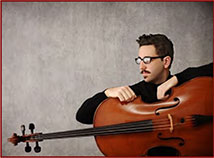 I never thought I would have pursued music as a career if you would have asked me 10 years ago. I didn’t have a serious musical upbringing. I played for fun, and I wasn’t particularly career-minded. For me, it was just something to do. When it was time to figure out post-secondary education, I realized that nothing gave me more joy than playing music. I was told, find a way to make a career doing what you love and you’ll never have to work a day in your life.
I never thought I would have pursued music as a career if you would have asked me 10 years ago. I didn’t have a serious musical upbringing. I played for fun, and I wasn’t particularly career-minded. For me, it was just something to do. When it was time to figure out post-secondary education, I realized that nothing gave me more joy than playing music. I was told, find a way to make a career doing what you love and you’ll never have to work a day in your life.
When did you fall in love with the instrument you play?
To be cliché, it was love at first sight. I saw an instrument demo in 4th grade and immediately asked for a cello from my parents. Reaching out to young people is so important, I owe my life to that.
What are some of the challenges in performing cello repertoire?
With all music, I believe there to be universal challenges: communicating with collaborators in unity, TONE, and presenting material in an interesting and relatable way to audiences of variable musical backgrounds.
What do you look forward to when you play for M.U.S.I.C.?
The experience. Bringing music to the audience in an environment that is familiar to them (the home) and the awesome receptions afterward.
During these challenging times for classical music, how do you see yourself promoting this art form?
I don’t believe classical music is suffering at all. Like all creative facets, it evolves in constant flux. When asked what I do, I find cello no longer suffices. As musicians we are entrepreneurs, performers and manufacturers of music. The best way I can see growth and promotion is through innovation. That’s why finding your voice is so important. One needs to create a vision and then manifest it into something that enriches the lives of others. The best inspiration for this can be found by looking at other businesses. A musician can learn wonderful things by examining Steve Jobs or Disney World. And also outreach, as I mentioned earlier. Without that, I would possibly never be the cellist, entrepreneur, performer I am today.
Comments from Zsolt Bognár, pianist and host of “Living the Classical Life”
M.U.S.i.C. Commissions a Concerto
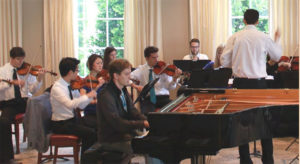
Alexander Malikov, pianist, premieres his “Chamber Concerto”, which was commissioned by M.U.S.i.C. for the September 2016 benefit concert. It was performed by the M.U.S.i.C. International Orchestra and conducted by Gaddiel Dombrowner. Watch an excerpt from the performance.
Meet Our Board Members – Arthur Rotatori
How did you first learn about M.U.S.i.C.?
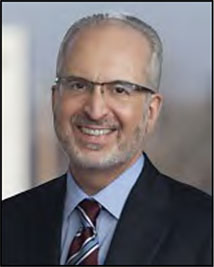 I was walking down the street in Chagrin Falls one day several years ago and I noticed in the window of the local arts organization a flyer advertising an upcoming M.U.S.i.C. concert. I had never heard of the group before, but because I was intrigued by the program, and the idea of attending a concert in a private home, I decided at that moment to get tickets.
I was walking down the street in Chagrin Falls one day several years ago and I noticed in the window of the local arts organization a flyer advertising an upcoming M.U.S.i.C. concert. I had never heard of the group before, but because I was intrigued by the program, and the idea of attending a concert in a private home, I decided at that moment to get tickets.
When did you become interested in classical music?
I would say I became seriously interested as an adult. I kept looking for more challenging and satisfying musical experiences, while listening to all sorts of genres on the radio. I was probably unusual in that I like 20th century music and Baroque music before I liked the standard Classical/Romantic repertoire. I later discovered that I really liked the intimacy of chamber music, which is one of the paths that led to M.U.S.i.C.
What made you want to join the board?
Well, Jodi asked me! But I had been attending concerts for a while, I knew that I liked the group and the people that I had met. I was also looking for an opportunity to more directly support an arts organization when Jodi asked me, so everything came together.
What’s your favorite thing about M.U.S.i.C.?
I can’t limit it to just one thing, so I would say: working with remarkable young musicians, great concerts in intimate settings, an ability to work with an organization that is growing.
Who is your favorite composer, classical or otherwise?
This one is almost impossible to answer, but I would say that the proverbial trio of Faure, Debussy and Ravel is one answer, but I could never leave out Piazzolla either.
If you had to tell people one thing about M.U.S.i.C., what would it be?
That our concerts offer a unique combination of great music, a chance to meet the musicians, and to work with nice people who feel the same way.
What do you do for work?
I am a partner in the Cleveland office of McGlinchey Stafford, a national law firm that is known for its consumer financial services practice. We help companies like banks or other lenders with the challenges of complying with state and federal law that regulates what they do.
Where else do you volunteer?
I was part of the Friends of Apollo’s Fire when that group was still active. I am considering some other volunteer board opportunities at the moment.
Tell me one other thing about you that M.U.S.i.C. should know.
That I am an adult violin student who only wishes that he could do what M.U.S.i.C. violinists can do!
Scenes from our May Musical Salons

Upcoming M.U.S.i.C. Programs: Watch for our announcements!
January/February 2017
Winter Musical Salons / House Concerts
March 2017
Classical Cabaret No. 16
Orange Village Hall
May 2017
Spring Musical Salons / House Concerts
July 2017
Classical Cabarets Nos. 17 & 18
Orange Village Hall
September 17, 2017
“Celebrating Our Stars”
Benefit Brunch, Concert, and Auction
Beechmont Country Club
December 2017
Winter Musical Salons / House Concerts
2016 December Newsletter: Read as PDF
About M.U.S.i.C.
M.U.S.i.C. (Musical Upcoming Stars in the Classics) is committed to providing intimate performance opportunities for emerging world class musicians in Northeast Ohio, and beyond. M.U.S.i.C. finds venues, arranges concerts, provides programs, publicity, and refreshments, and pays performers. By its activities, M.U.S.i.C. provides enjoyment for audiences, helps launch new musical careers, introduces novel performance venues, and expands the audience for chamber music. M.U.S.i.C. aims to enhance Northeast Ohio’s reputation as an international capital of musical excellence.
Board of Directors: Chauncey Aceret • Michael Bailis • Frank Buck • Faye D’Amore • Julie Frazier • Tuba Gokoglu • Mia Kim • Carol Arnold Porter • Arthur Rotatori • Robert Villarreal
Artistic Director: Jodi Kanter
M.U.S.i.C. welcomes friends, volunteers and supporters
Please call 216.702.7047 or email: stars@intheclassics.org
